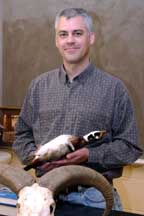
|
| Dr. Jeff Duguay, assistant professor of biology at Delta State University, will teach introduction wildlife courses as part of the University’s newly approved wildlife management concentration in the Division of Biological and Physical Sciences.
|
Upon completion of the coursework designed for this program, students will have taken the necessary curriculum required by The Wildlife Society, the professional society of wildlife biologists and managers, to be eligible for certification as a certified wildlife biologist.
Students who complete the wildlife management concentration will be able to pursue careers with both state and federal wildlife agencies, the U.S. Department of Agriculture, private consulting firms, private wildlife organizations, such as the National Wild Turkey Federation, the Rocky Mountain Elk Foundation, the Wildlife Habitat Council and the Audubon society, as well as many others. Likewise, wildlife management undergraduates can choose to further their studies at the graduate level, pursuing an advanced degree in wildlife management.
At the undergraduate level, students in the wildlife management option will gain hands-on experience in wildlife sampling and habitat management techniques, as courses include introduction to wildlife management, wildlife sampling techniques, wildlife habitat management, ornithology, mammalogy, herpetology, as well as other subject topics.
“I’m really excited to have this wildlife management option available at Delta State University,” offered Dr. Jeff Duguay, assistant professor of biology. “The Delta provides an excellent setting for students to learn about wildlife and their management and with Dahomey National Wildlife Refuge so close to campus, students can expect to spent class time in a natural setting.”
For more information on the wildlife management concentration at Delta State University, please contact Duguay at (662) 846-4242 or email jduguay@deltastate.edu.
A detailed listing of the required courses for the Environmental Science: Wildlife Management Concentration is available online from the Division of Biological and Physical Sciences website at: https://www.deltastate.edu/docs/bio_phy_sci/env-science-wildlife.html.
The Division of Biological and Physical Sciences offers bachelor’s degrees in biology, chemistry, and environmental science and biology education. It also provides pre-professional programs for students preparing for health-related fields, such as medicine, dentistry, physical therapy, pharmacy, etc. For complete descriptions of all undergraduate programs, visit the Division on the web at sciences.deltastate.edu.


